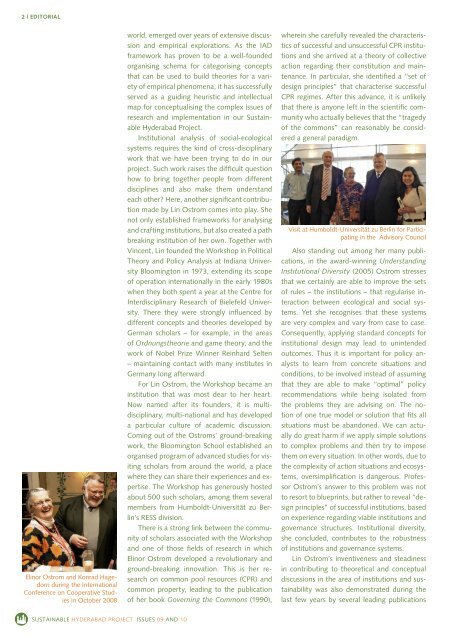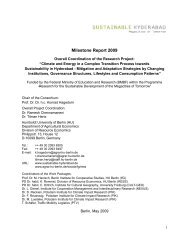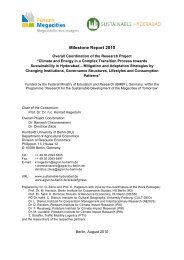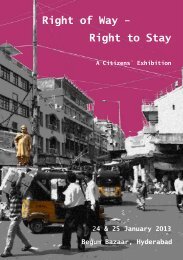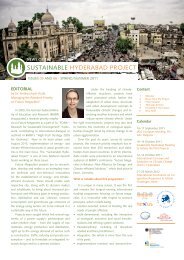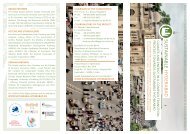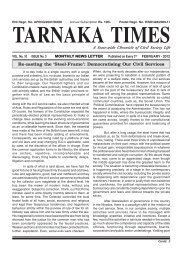SUSTAINABLE HYDERABAD PROJECT
SUSTAINABLE HYDERABAD PROJECT
SUSTAINABLE HYDERABAD PROJECT
Create successful ePaper yourself
Turn your PDF publications into a flip-book with our unique Google optimized e-Paper software.
2 | NEWS EDITORIAL FROM THE <strong>PROJECT</strong><br />
Elinor Ostrom and Konrad Hagedorn<br />
during the International<br />
Conference on Cooperative Studies<br />
in October 2008<br />
world, emerged over years of extensive discussion<br />
and empirical explorations. As the IAD<br />
framework has proven to be a well-founded<br />
organising schema for categorising concepts<br />
that can be used to build theories for a variety<br />
of empirical phenomena, it has successfully<br />
served as a guiding heuristic and intellectual<br />
map for conceptualising the complex issues of<br />
research and implementation in our Sustainable<br />
Hyderabad Project.<br />
Institutional analysis of social-ecological<br />
systems requires the kind of cross-disciplinary<br />
work that we have been trying to do in our<br />
project. Such work raises the difficult question<br />
how to bring together people from different<br />
disciplines and also make them understand<br />
each other? Here, another significant contribution<br />
made by Lin Ostrom comes into play. She<br />
not only established frameworks for analysing<br />
and crafting institutions, but also created a path<br />
breaking institution of her own. Together with<br />
Vincent, Lin founded the Workshop in Political<br />
Theory and Policy Analysis at Indiana University<br />
Bloomington in 1973, extending its scope<br />
of operation internationally in the early 1980s<br />
when they both spent a year at the Centre for<br />
Interdisciplinary Research of Bielefeld University.<br />
There they were strongly influenced by<br />
different concepts and theories developed by<br />
German scholars – for example, in the areas<br />
of Ordnungstheorie and game theory, and the<br />
work of Nobel Prize Winner Reinhard Selten<br />
– maintaining contact with many institutes in<br />
Germany long afterward.<br />
For Lin Ostrom, the Workshop became an<br />
institution that was most dear to her heart.<br />
Now named after its founders, it is multidisciplinary,<br />
multi-national and has developed<br />
a particular culture of academic discussion.<br />
Coming out of the Ostroms’ ground-breaking<br />
work, the Bloomington School established an<br />
organised program of advanced studies for visiting<br />
scholars from around the world, a place<br />
where they can share their experiences and expertise.<br />
The Workshop has generously hosted<br />
about 500 such scholars, among them several<br />
members from Humboldt-Universität zu Berlin’s<br />
RESS division.<br />
There is a strong link between the community<br />
of scholars associated with the Workshop<br />
and one of those fields of research in which<br />
Elinor Ostrom developed a revolutionary and<br />
ground-breaking innovation. This is her research<br />
on common pool resources (CPR) and<br />
common property, leading to the publication<br />
of her book Governing the Commons (1990),<br />
wherein she carefully revealed the characteristics<br />
of successful and unsuccessful CPR institutions<br />
and she arrived at a theory of collective<br />
action regarding their constitution and maintenance.<br />
In particular, she identified a “set of<br />
design principles” that characterise successful<br />
CPR regimes. After this advance, it is unlikely<br />
that there is anyone left in the scientific community<br />
who actually believes that the “tragedy<br />
of the commons” can reasonably be considered<br />
a general paradigm.<br />
Visit at Humboldt-Universität zu Berlin for Participating<br />
in the Advisory Council<br />
Also standing out among her many publications,<br />
in the award-winning Understanding<br />
Institutional Diversity (2005) Ostrom stresses<br />
that we certainly are able to improve the sets<br />
of rules – the institutions – that regularise interaction<br />
between ecological and social systems.<br />
Yet she recognises that these systems<br />
are very complex and vary from case to case.<br />
Consequently, applying standard concepts for<br />
institutional design may lead to unintended<br />
outcomes. Thus it is important for policy analysts<br />
to learn from concrete situations and<br />
conditions, to be involved instead of assuming<br />
that they are able to make “optimal” policy<br />
recommendations while being isolated from<br />
the problems they are advising on. The notion<br />
of one true model or solution that fits all<br />
situations must be abandoned. We can actually<br />
do great harm if we apply simple solutions<br />
to complex problems and then try to impose<br />
them on every situation. In other words, due to<br />
the complexity of action situations and ecosystems,<br />
oversimplification is dangerous. Professor<br />
Ostrom’s answer to this problem was not<br />
to resort to blueprints, but rather to reveal “design<br />
principles” of successful institutions, based<br />
on experience regarding viable institutions and<br />
governance structures. Institutional diversity,<br />
she concluded, contributes to the robustness<br />
of institutions and governance systems.<br />
Lin Ostrom’s inventiveness and steadiness<br />
in contributing to theoretical and conceptual<br />
discussions in the area of institutions and sustainability<br />
was also demonstrated during the<br />
last few years by several leading publications<br />
<strong>SUSTAINABLE</strong> <strong>HYDERABAD</strong> <strong>PROJECT</strong> ISSUES 09 AND 10


